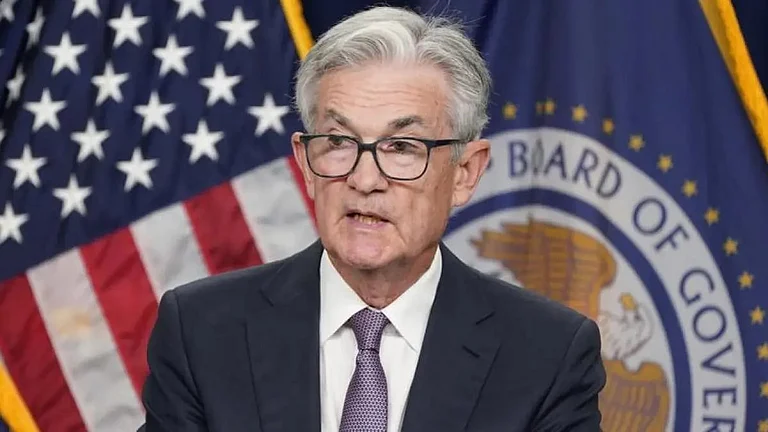The US Federal Reserve on Wednesday slashed its benchmark interest rate by an unusually large 50 basis points to 4.75 per cent to 5 per cent, in an aggressive start to a policy shift aimed at bolstering the US labor market. The central bank maintained the interest rate at the 23-year high for 14 consecutive months since July 2023 to curb the worst inflation outbreak in almost 40 years.
The Federal Open Market Committee (FOMC) voted 11 to 1 to lower the federal funds rate. Governor Michelle Bowman dissented in favour of a smaller, 25 basis point rate cut, the first dissent by a governor since 2005, and the first dissent from any member of the FOMC since 2022.
“The US economy is in a good place and our decision today is designed to keep it there,” Fed chair Jerome Powell said at a press conference after announcing the decisions Wednesday. The consensus among Fed officials at the meeting was that they now expect two more 25 bps cuts this year, followed by four more cuts next year and two more cuts in 2026.
Powell's outlook will likely play a crucial role in determining the direction of stocks and bonds for the rest of 2024.
The possibility of a "soft landing," where the Fed manages to control inflation without triggering a recession, has boosted the stock and bond market this year. However, indications of a weakening labor market have raised concerns that the Fed might be acting too late to support growth.
Should Markets Worry About Recession in US?
Historically, US Equity markets have performed well during Fed rate-cutting cycles, particularly if a recession is avoided.
Unmesh Kulkarni, Managing Director and Senior Advisor at Julius Baer India says rate cuts from the Fed generally tend to create a ‘risk-on’ environment, which is positive for equities. However, we must note that no two rate cycles (and their follow-through impact) are identical.
The global macroeconomic environment is currently favourable for equities. However, volatility in equity markets is likely to stay elevated, given the uncertainty around the upcoming US elections, ongoing concerns of an economic slowdown/recession in the US, as well as other (e.g., seasonal, geopolitical) factors.
If we leave aside the emergency rate cuts of the COVID-19 pandemic period, the last time the Fed cut rates by 50 bps was during the global financial crisis of 2008. Three cuts of 50 basis points in the next 12 months will trigger a feeling in the markets that recession fear is back. Historically, whenever the Fed has initiated a 50 bps rate cut, the US economy has often entered a recession.
Narinder Wadhwa, Managing Director & CEO of SKI Capital says despite Powell’s recent comments emphasizing the strength of the economy and improvements in unemployment data, the underlying signals warrant caution.
In his speech, the Fed chair acknowledged that while unemployment is currently within range, the Fed is prepared to act if inflationary pressures persist.
According to US Labor Department data, the US economy added 1,42,000 jobs in August, while the unemployment rate edged slightly lower to 4.2 per cent from 4.3 per cent.
Markets are already betting on further rate cuts, raising concerns about the longer-term outlook. Even though the economy appears strong today, with unemployment showing improvement, history suggests that aggressive rate cuts often signal deeper economic issues.
Wadhwa says a potential recession remains on the radar, particularly as the Fed has projected higher unemployment over the next two years.
“Investors should weigh both current optimism and historical precedent, remaining cautious about the possibility of economic weakness despite today’s favorable data,” he said.
Pradeep Gupta, Co-founder & Vice-chairman, Anand Rathi Group says amid signs of slowing growth and controlled inflation, investors are weighing whether the Fed has delayed too long in cutting rates, potentially increasing the risk of a recession.
“The central bank’s goal is to lower rates without disrupting the labor market, aiming for what economists refer to as a “soft landing” – allowing the economy to cool without triggering significant job losses. However, historical precedents show that achieving such an outcome is rare,” Gupta said.
For US markets, lower interest rates generally boost stock prices by making riskier assets more attractive. However, the immediate market response will depend on whether investors view the rate cut as a sign of economic stabilization or a signal that the Fed is struggling to keep inflation under control.
In the longer term, the direction of the Indian stock market will depend largely on global economic conditions, particularly the health of the US economy. “If the US achieves a soft landing and avoids a recession, Indian equities may experience gradual growth. However, if the global outlook deteriorates, Indian markets – especially mid-and small-cap segments – could face increased volatility,” Gupta said.
































